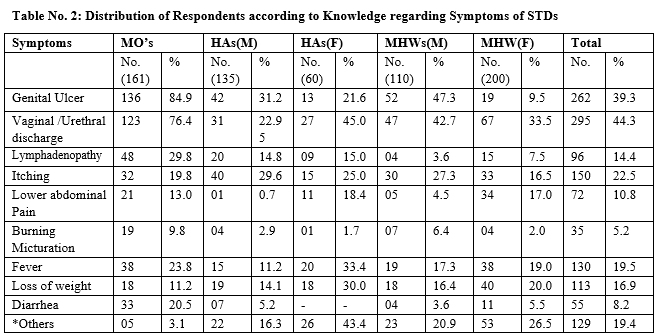Knowledge about sexually transmitted diseases among primary health care providers
Abstract
Objective: The objective of this study was to assess the knowledge about sexually transmitted diseases among various health care providers who attended the in-service training.
Material & Methods: The study is of cross sectional design. The participants included in the study were the various level health care providers, viz. Medical Officers, Health Supervisors (Male & Female) and Multipurpose Health Workers (Male &Female).
Results: Six hundred and sixty six health care providers had participated in the study. 74.7 % of the respondents mentioned AIDS as Sexually transmitted Disease, 49.5% syphilis and 45% gonorrhea. The most important symptoms mentioned were genital ulcer (39.3%), vaginal/urethral discharge (44.3%), fever (19.5%) and loss of weight (16.9%).
Conclusion: In general, this study shows low level of awareness regarding Sexually Transmitted Diseases. Health care providers play important role in dissemination of knowledge, hence their awareness regarding Sexually Transmitted Diseases should be of optimal level.
Downloads
References
2. UN AIDS. Summary of the Declaration of Commitment of HIV/AIDS. Special session on HIV/AIDS. New York:(accessed UNAIDS ;2001)
3. NACO. Training Module on The Sentinel surveillance of HIV infection. New Delhi: NACO , GOI;1993
4. WHO. Guidelines for the management of sexually transmitted infections. Geneva. World Health Organization 2003.
5. NACO. Specialist training and reference module NACO II (1999-2004). New Delhi :MOH and FW GOI
6. National AIDS Control Organization. Country scenario 1997-98. Ministry of Health and Family Welfare: New Delhi; 1998.
7. . NCASC. National STI Case Management Guidelines. Kathmandu, Nepal: Ministry of Health and Population; 2001.
8. Adhikari C., Sherchan L., Thapa S., Adhikari L. Effectiveness of syndromic STI case management/RH training in knowledge and practice of auxiliary health workers. Journal of Universal College of Medical Sciences. 2014;2(3)
9. Lan PT Mogren IPhuc HD Stålsby Lundborg C (Knowledge and practice among healthcare providers in rural Vietnam regarding sexually. Transmitted infections., Journal of the American Sexually Transmitted Disease Association, Vol.36, issue 7, pp452-458, 2009.
10. S. N. Iipinge and L. Pretorius, “The delivery and quality of sexually transmitted infections treatment by private general practitioners in Windhoek Namibia,” Global Journal of Health Science, vol. 4, no. 5, pp. 156–171, 2012.
11. M. F. A. Hussain, M. R. Khanani, S. E. Siddiqui, N. Manzar, S. Raza, and S. Qamar, “Knowledge, attitudes & Practices (KAP) of general practitioners (GPs) regarding sexually transmitted diseases (STDs) and HIV/AIDS in Karachi, Pakistan,” Journal of the Pakistan Medical Association, vol. 61, no. 2, pp. 202–205, 2011.

Copyright (c) 2016 Author (s). Published by Siddharth Health Research and Social Welfare Society

This work is licensed under a Creative Commons Attribution 4.0 International License.


 OAI - Open Archives Initiative
OAI - Open Archives Initiative


